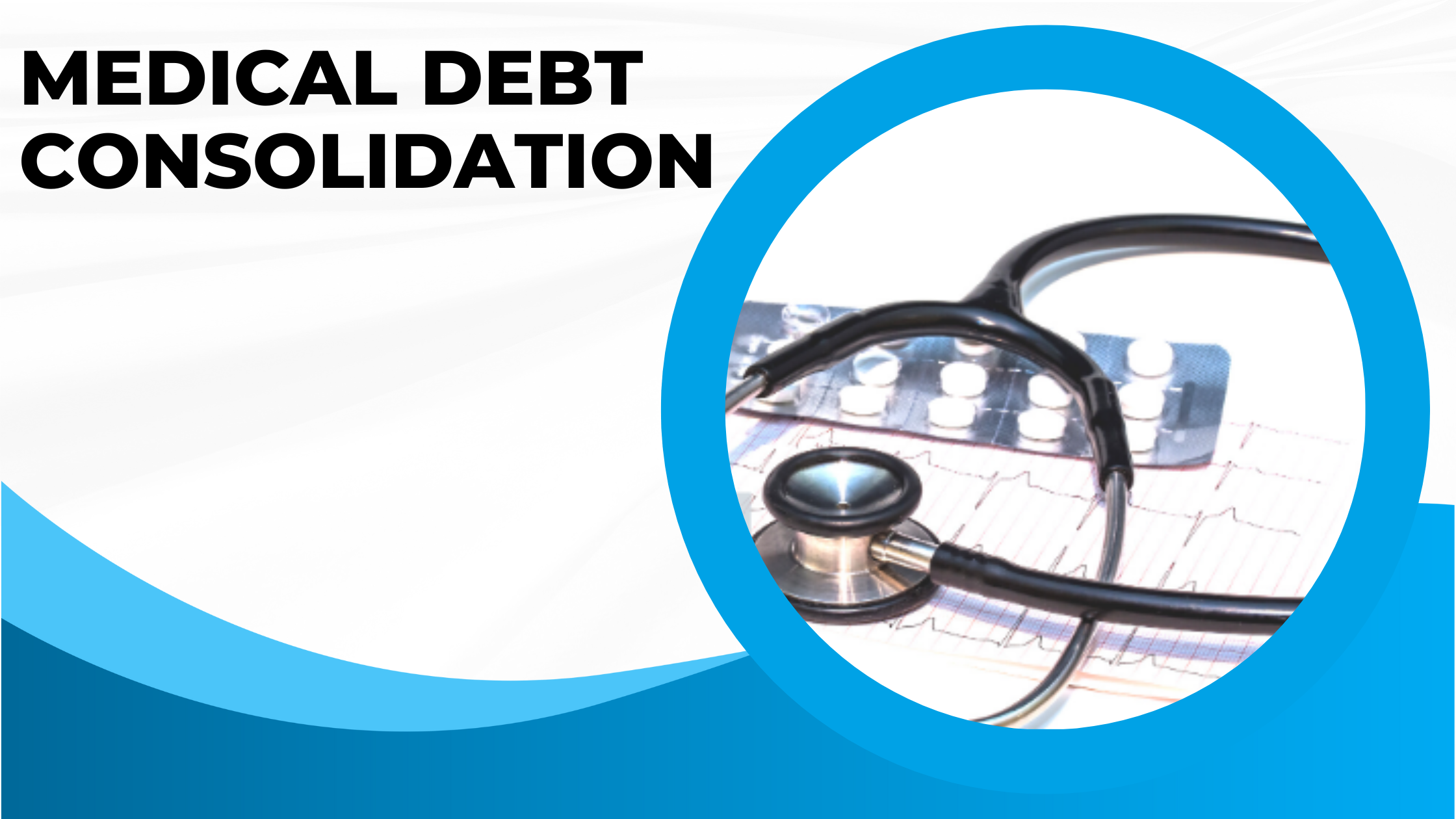Table of Contents
ToggleWhat is Medical Debt Consolidation?
It’s possible to owe more than one healthcare entity medical care money. This is usually a result of several out-of-pocket healthcare costs. Medical debt consolidation involves combining all individual medical debts so that you only make one payment on a specific date, monthly. Having just one payment date means you don’t need to make multiple medical payments monthly.
For instance, you may owe $5,000 for an operation, dental care charges of $2,000, a consultation fee of $100, and ambulance services of $350. Instead of making monthly payments to all these creditors, you can take a medical consolidation loan. This means you will only make one payment monthly in addition to interest.
Benefits of Medical Debt Consolidation
There are several reasons why people go for this debt consolidation:
Convenience
Making multiple debt payments per month can get complicated because each creditor has its specific terms of payment. Besides that, you might easily get torn regarding what payments to make and what to avoid. However, medical debt consolidation helps to eliminate these aspects.
Safety
If you have only one bill to pay, you will less likely to forget to pay it. This will help avoid your debts going to a collections agency.
Reduced Interest Rates
Debt consolidation can potentially lead to reduced interest rates. This is particularly possible if you have a specialty card designed for use in a medical office or your medical bills are charged to your credit cards.
How to Consolidate Medical Bills
Managing a hefty medical bill isn’t easy. However, one of the standard methods of solving this issue is debt consolidation.
But how does it work?
During this process, borrowers are usually helped to manage their debts in several ways. This could be by:
- Requesting longer periods for pay-offs
- Reduced interest rates
- Lower payment options
- A combination of the above three
The general process of consolidation typically involves:
Go for the Lowest Medical Bills
Conduct comprehensive research before you visit your medical care provider. Look for the best healthcare options, especially for costly procedures. Secondly, you can negotiate with the health provider to pay low medical bills. Lastly, you can look for better payment support alternatives. This could be from an insurance company or local or state medical subsidies.
The Tax Implications
It’s also important to consider the tax effects of consolidating a medical bill. If you plan effectively for it, you can significantly reduce your total tax bill.
How can you do this?
If you have insurance with a high rate of deduction, then you need to develop a Health Savings Account. This is where you will put money annually into your pretax account for medical expenses. Note that any amount that’s not used will get carried forward into the following years.
If you have adequate discretionary income, you can put the annual family or individual amount into this type of fund. As a result, that amount will get subtracted from your total gross income, and you will end up paying no taxes on that money.
Pay Your Medical Debt
Start by paying the bills referred to as “Going to Collection” first. Paying these should be done before these bills are moved from the health facility to the collection agency. Understand that unpaid and late bills will negatively affect your credit card score. As a result, you will have reduced chances of getting credit access. Besides that, lenders will subject you to high-interest rates.
Ways to Consolidate Medical Debt
There are several options for consolidating a medical debt:
Using Personal Loans
Personal loans can be used for all types of expenses. It’s only your credit card rating and the lender’s term of service that matters. However, make sure you critically compare and analyze the lenders’ interest rates and terms of payment.
Home Equity Loans
You can use your home as collateral by taking a home equity loan to pay your medical debt. Note that a home equity loan is usually secured, while medical debt is not. However, make sure that you consider the implications of such a loan. This is because you will be converting unsecured debt into secured debt. Be aware that if you default on the home equity loan, you will lose your home.
Zero Percent Credit Cards
You can consider this option if you are eligible for a zero-percent interest credit card. This means you need to have a high credit limit, or your credit score should be good. But just like the other options, you need to exercise caution. This is because there will be interest charges once the no-interest period elapses. Sometimes these interest charges are high, and you may end up paying high amounts.
So, Should You Consolidate Your Medical Debt?
Unlike other debts, medical debts won’t accrue interest. Although they may be penalized, interest rates can’t be applied to them. Therefore, you can use a debt consolidation loan to get out of this debt. This means converting a debt without interest charges to one with interest charges. However, you need to know that you will end up paying more.
You can use debt management to negotiate with your creditors. Overall, the goal is to ensure the medical debt is paid off. The best thing about a debt management program is that you can use it to consolidate other bills as well.
Downsides of Medical Debt Consolidation
This debt payment system also comes with its disadvantages. They include:
Taking out medical debt consolidation loan has interest charges:
If you decide to take out your medical debt consolidation loan, then be prepared to pay interest. It should be noted that medical debt from hospitals or a doctor’s office usually doesn’t have interest rates.
You can put your home at risk:
Loan options such as home equity loans used as collateral for medical debt can easily put your property at risk. This is because you might end up defaulting on the loan. As a result, the lender will repossess your property to recoup the money.
Other Options for Medical Debt Consolidation
If you don’t want to consolidate your medical bills, there are several different options that you can consider.
Critically Analyze Your Medical Bills
Make sure that you take time to go through your medical bills. It’s essential to verify that what you are billed for is correct. This helps to minimize the chances of any errors. It’s not unusual for these bills to have mistakes, and the most common ones usually include the following:
- Duplicate charges
- Incorrect duration of surgery or the time under an anesthesia
- Charges for canceled tests or medical procedures and others.
Note: If you find a billing error, request an updated bill.
Seek the Services of a Credit Counselor
Several medical conditions accrue massive medical debt. However, it’s possible to navigate this issue without medical debt consolidation. A credit counselor can help you to negotiate with collection agencies to create an affordable medical payment plan.
Besides, these professionals can advise you on handling your finances. This way, you will learn how to effectively plan your medical bills budget.
Negotiate
Did you know that it is possible to negotiate your medical bills? Well, you can ask your healthcare provider for financial assistance programs. Understand that most hospitals don’t provide patients with information regarding the financial assistance program. But it’s there if you ask for it.
Negotiating is essential, especially if you want to request an affordable payment plan. Besides that, you can use the opportunity to request a payment offer. This can help to reduce the total amount that you owe them. Alternatively, if they agree to a particular payment plan, your bill will be split into affordable installments.
Note: Although you can declare bankruptcy, this should be the last option to consider. This is because bankruptcy results in a serious credit score impact and will massively affect your financial reputation. The advantage of this is that it may save your property from foreclosure.
The Bottom Line
Medical debt is one of the many causes of financial woe. The general cost of healthcare has increased significantly over the years, even with the development of technology. On the other hand, salaries are dwindling. As a result, most people end up in medical debt while seeking even the most basic healthcare services.
Owing money to multiple entities can be costly. First, you end up making multiple payments every month. In addition, you need to have a priority list of what to pay and what to ignore. However, medical debt consolidation can help ease all these complications. All you have to do is analyze your finances and then get the best consolidation loan.

